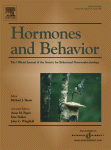There were three experimental conditions which differed only by the source of dietary protein: casein and lactalbumin (no isoflavones), soy protein isolate containing 0.94 mg isoflavones/g protein, and soy protein isolate containing 1.88 mg isoflavones/g protein. In the monkeys fed the higher amount of isoflavones, frequencies of intense aggressive (67% higher) and submissive (203% higher) behavior were elevated relative to monkeys fed the control diet (P's < 0.05). In addition, the proportion of time spent by these monkeys in physical contact with other monkeys was reduced by 68%, time spent in proximity to other monkeys was reduced 50%, and time spent alone was increased 30% (P's < 0.02).

Increased aggressive behavior and decreased affiliative behavior in adult male monkeys after long-term consumption of diets rich in soy protein and isoflavones
Estrogen produced by aromatization of gonadal androgen has an important facilitative role in male-typical aggressive behavior that is mediated through…

